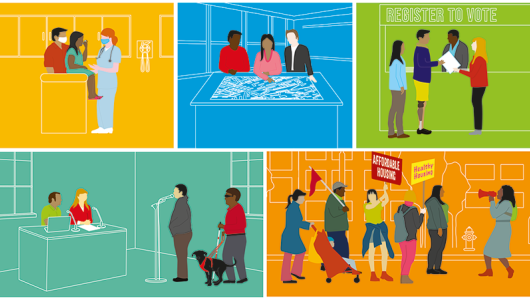
Share On Social!
ChangeLab Solutions recently updated their interactive web tool, Undoing the Drivers of Health Inequity, with new resources to support policy strategies to advance health and justice.
The tool points to five fundamental drivers of health inequity.
“The fundamental drivers of health inequity are systemic factors that shape people’s physical and social surroundings in ways that create barriers to health,” according to ChangeLabs Solutions. “[We] use legal and policy strategies to undo the drivers of inequity by changing the distribution of resources and power.”
Let’s explore this tool and how it can help Latino communities!
1. Structural Discrimination
Some people, especially Latinos and other people of color, face health barriers because of structural and systemic policies that curb their access to quality housing, transportation, medical care, food, jobs, schools, parks and other social determinants.
Individuals have no choice when it comes to these structural health barriers.
“Policies, practices, and other norms reinforce each other, forming a system and a culture that allows privileges associated with whiteness to endure and adapt over time,” according to ChangeLab Solutions.
This is a macro-level influence on the remaining four fundamental drivers of health inequity.
2. Income Inequality and Poverty
The tool highlights that in less-wealthy communities, lack of funding or investment means fewer health-promoting amenities.
Similarly, laws and policies play a central role in access to wealth.
“The ability to earn sufficient income and accumulate wealth determines whether families can access and afford the basic resources and services that are needed to lead a healthy life,” according to ChangeLab Solutions.
3. Disparities in Opportunity
This includes factors like school environments, level of education, and access to high-paying jobs.
Inequities in opportunities further contribute to the widening of gaps in wealth and health between underserved communities and wealthier ones.
“Inequitable access to quality education and economic opportunities creates fundamental barriers to healthy living in childhood, in working life, and for future generations,” according to ChangeLab Solutions.”
4. Disparities in Political Power
With a record number of Latinos poised to vote in Election 2024, their representation among voters (11.1%) is less than their representation in the U.S. population (19.1%).
Unequal political power can lead to communities, families, and individuals experiencing difficulties in making their problems and needs visible to government and institutional decision makers.
“Voting laws can exacerbate disparities in political power by creating barriers to democratic participation and supporting election of officials whose race and life experiences are not representative of the neighborhoods they serve,” according to ChangeLab Solutions.
5. Governance that Limits Meaningful Participation
The tool highlights that key components of governance include people, decision-making processes, and structures that ensure implementation of agreements.
“Governance structures determine how power is distributed and exercised in decision making that shapes places as well as access to resources and opportunities,” according to ChangeLab Solutions.
Combating Health Inequities in the Latino Community
Latinos disproportionately face many health inequities, such as a lack of access to healthy and nutritious food and healthcare, which contribute their high rates of cancer and obesity.

Undoing the Drivers of Health Inequity can serve as an important tool in identifying the issues that you or your community may experience.
The tool provides strategies to address each driver, resources for change, and success stories on how ChangeLab Solutions has worked with local communities, organizations, and other partners to improve these various drivers of health inequities.
For example, ChangeLab Solutions helped fuel cross-sector teams in 18 US cities through The BUILD Health Challenge®, bridging disparities in opportunities for partners seeking to improve food access, maternal health, and affordable housing.
“We provide real-world examples of how communities across the country have used equitable policymaking to confront the drivers of health inequity and create systems change,” according to ChangeLab Solutions.
Advocate for Change with the Health Equity Report Card
You have a role to play, too.
With the Health Equity Report Card from Salud America! at UT Health San Antonio, you can examine local data with interactive maps on several health-related issues including housing, education, socioeconomic status, and more.
Compare the results of your county to other counties and states across the nation.
“You can share an interactive version of your local Health Equity Report Card with decision-makers to build the case to address existing systemic inequities in your community so that everyone has a fair, just opportunity to live their healthiest lives possible,” said Dr. Amelie G. Ramirez, director of Salud America! at UT Health San Antonio.
GET YOUR HEALTH EQUITY REPORT CARD!
By The Numbers
3
Big Excuses
people use to justify discriminatory behavior




[…] 80,000 in the Vietnam War in 1959-1973, and more than 400,000 in World War II in 1939-1945, reports Salud […]